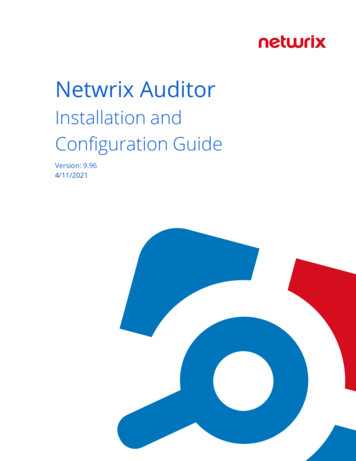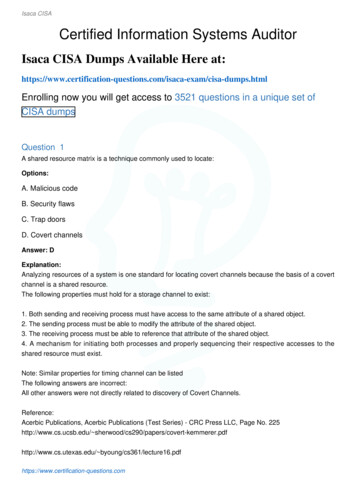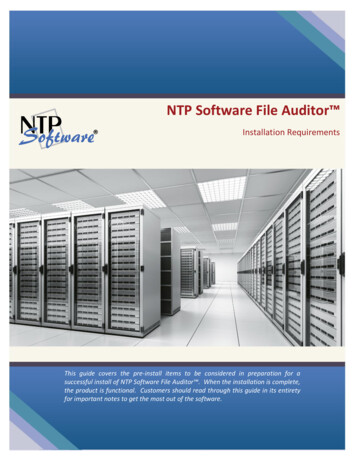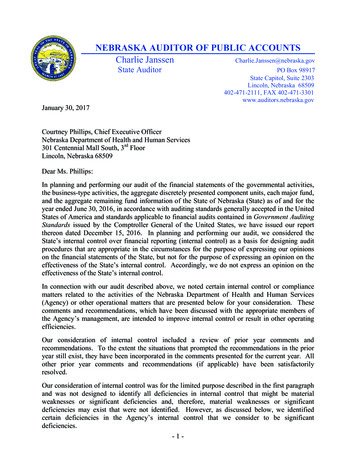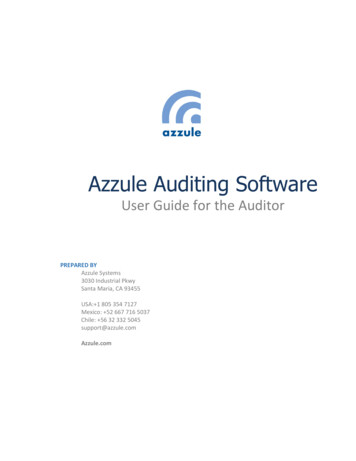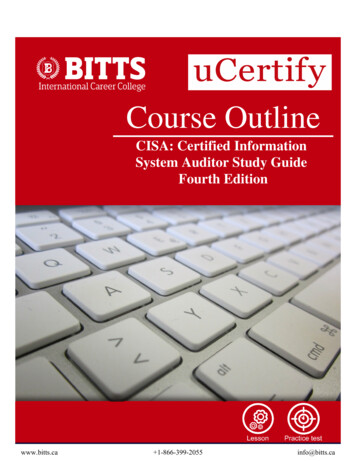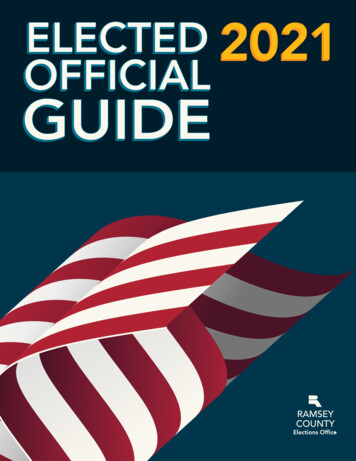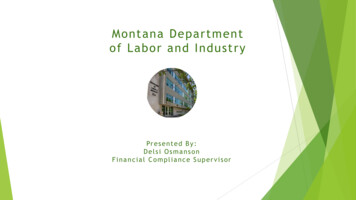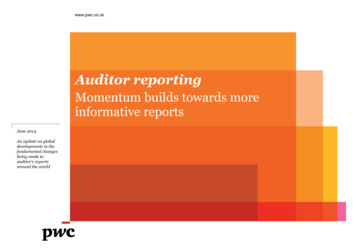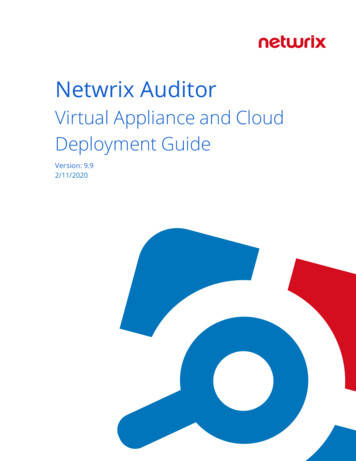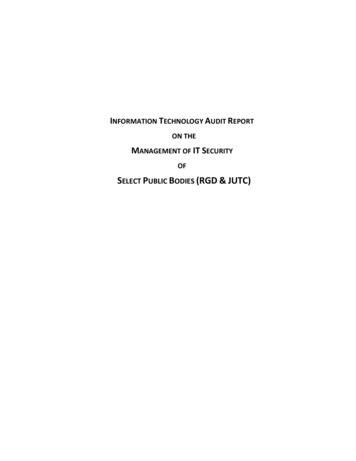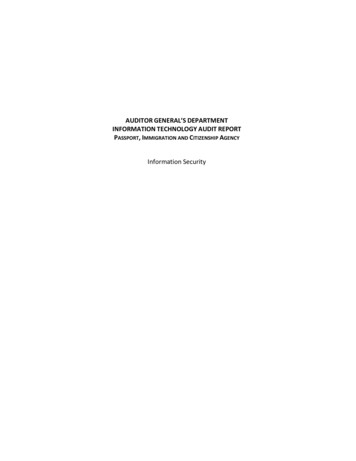
Transcription
AUDITOR GENERAL’S DEPARTMENTINFORMATION TECHNOLOGY AUDIT REPORTPASSPORT, IMMIGRATION AND CITIZENSHIP AGENCYInformation Security
The Auditor General is appointed by theGovernor General and is required by theConstitution, Financial Administration andAudit Act, other sundry acts and letters ofengagement, to conduct audits at least onceper year of the accounts, financialtransactions, operations and financialstatements of central government ministriesand departments, local governmentagencies, statutory bodies and governmentcompanies.The Department is headed by the AuditorGeneral, Pamela Monroe Ellis, who submitsher reports to the Speaker of the House ofRepresentatives in accordance with Section122 of the Constitution of Jamaica andSection 29 of the Financial Administrationand Audit Act.This report was prepared by the AuditorGeneral’s Department of Jamaica forpresentationtotheHouseofRepresentatives.Auditor General of JamaicaAuditor General’s Department40 Knutsford BoulevardKingston 5, Jamaica, W.I.www.auditorgeneral.gov.jm‘A better country through effective audit scrutiny’Page 2Document No.:Date SubmittedAuGD354 – 1601.52.22021/09/16Information Technology AuditPassport, Immigration and Citizenship AgencyAugust 2021‘A better Country through effective audit scrutiny’
Table of ContentsAuditor General’s Overview .5Executive Summary .6What We Found. 6What Should Be Done. 10Part One. 11Introduction . 11Background . 11Audit Objective, Scope and Methodology . 12Part Two . 14Information Security: Governance and Management. 14Improvements needed in ICT Oversight and Planning . 15Unmanaged Threats and Vulnerabilities pose Information Security risks . 16Inadequate Security Policy Management. 19Poor Access Control practices increases risk of security breaches . 20Appendix 1: Separated staff with active network and application user account. 23Page 3Information Technology AuditPassport, Immigration and Citizenship AgencyAugust 2021
This page was intentionally left blankPage 4Information Technology AuditPassport, Immigration and Citizenship AgencyAugust 2021
Auditor General’s OverviewThe Passport, Immigration and Citizenship Agency (PICA) is responsible for accepting and processingpassport applications, managing the island’s immigration process and handling matters in relation toapplication for and renunciation of Jamaican citizenship. In fulfilling its mandate, the agency has adoptedthe use of Information Technology (IT) throughout its operations thereby creating risks that must beappropriately managed to ensure the continued availability of its services. Further, based on the natureof its operations, the agency handles personal information of its clients and national security data thatshould be safeguarded from inappropriate access and disclosure.I commissioned an IT audit to determine whether PICA’s information security controls were effective andwill prevent or reduce the likelihood and impact of IT security risks on the organization. The auditrevealed that though PICA had implemented good controls, there was room for improvement in theassessment of IT risks and access management. Additionally, PICA did not have an effective system inplace for the oversight of the IT function to ensure the proper alignment of IT and corporate strategiesand prioritization of its ICT projects.This report is intended to assist PICA in improving its IT Governance and Information Security controls toeffectively mitigate risks of unauthorised access and disclosure that may result in the unavailability of itssystems, reputational damages and legal actions. Additionally, PICA is urged to implement therecommendations to strengthen its information security management system and ensure theconfidentiality and integrity of its records.I wish to thank the management and staff of PICA for the courtesies extended to my staff during theaudit.Pamela Monroe Ellis, FCCA, FCAAuditor GeneralPage 5Information Technology AuditPassport, Immigration and Citizenship AgencyAugust 2021
Executive SummaryThe Passport, Immigration and Citizenship Agency (PICA) accepts and processes passport applications,manages the island’s immigration processes and handles matters in relation to application for andrenunciation of Jamaican citizenship. Given the nature of its services and dependence on technology toenhance its efficiency, the agency must adopt a robust information security management system toensure the confidentiality, integrity and availability of its data and systems. Additionally, the agency mustestablish formal governance structures to provide oversight and strategic direction in the use oftechnology whilst ensuring the delivery of value and management of the associated risks.An audit of PICA was undertaken to determine whether its information security controls are effective andwill prevent or reduce the likelihood and impact of IT security risks on the organization. We also assessedthe effectiveness of PICA’s IT governance and compliance with standards that are applicable to itsInformation and Communication Technology (ICT) operations.Key AuditQuestionDoes PICA have effective information security controls to prevent orreduce the likelihood or impact of IT security risks?What We FoundITGovernance PICA's management did not establish the relevant structures andprocesses to ensure the oversight of the ICT function and managementof IT risks within the agency. Absence of formal access control policies and procedures heightensInformationSecurityManagementPage 6risks of security breaches from abuse and unauthorized use of PICA'sinformation assets.Information Technology AuditPassport, Immigration and Citizenship AgencyAugust 2021
PICA to improve ICT Oversight and Planning1. PICA developed a five-year Information and Communication Technology (ICT) Road Map withproposed ICT investments of approximately US 13.3 million, but the agency did notdemonstrate that a collaborative approach was taken in the review, approval and monitoringof major ICT projects. To effectively provide oversight to the IT function, an organization shouldestablish an IT Steering Committee or equivalent of executive, business and IT management thatare responsible for prioritising IT investments, monitoring projects and service levels as well asresolving resource conflicts. PICA advised that the implementation of the projects by the ICT Unitwas discussed at monthly Director’s meetings, however neither the minutes of these meetingsnor the progress reports were provided to assess the extent of project monitoring and strategicdirection given in the execution of IT strategies.2. Additionally, our review of the ICT Road Map revealed that ten ICT strategic goals wereestablished, however the objectives were not clearly defined or aligned to PICA’s corporateobjectives for the 2018-2023 financial years. Also, whereas there was the alignment of 15 ICTprojects with the corporate objectives, the relationship between the respective projects and theICT strategic goals and objectives was not specified. Priority projects for each financial year werealso not highlighted to reduce the possibility of resource conflicts and project delays. Forinstance, we noted in March 2021 that only four of 12 projects planned between 2018 and 2020were completed, while the remainder were in early phases of the project management lifecycle.In the absence of an IT Steering Committee, PICA’s oversight mechanism may be insufficientin ensuring the delivery of value from the proposed ICT investments. There is also anincreased risk that ICT strategic objectives may not directly support the achievement oforganizational objectives. Further, project delays and conflicts may arise from resourcesbeing allocated to activities that are not strategic priorities and or resources may not beavailable to execute all planned activities.3. Subsequent to our audit PICA established an ICT Steering Committee to improve the alignment ofthe Agency’s ICT and business strategy and accountability for business decisions related toinvestments, projects, services and data.Unmanaged Threats and Vulnerabilities pose Information Security Risks4. PICA adopted an enterprise risk management (ERM) framework in its strategic planningprocess, which involves an analysis of technological risks to the achievement of its corporateobjectives. However, formal risk assessments of its software, hardware, users, data andinformation were not conducted to identify and evaluate risks from ICT threats andvulnerabilities. As a result, our audit identified instances in which the agency did notappropriately manage risks of unauthorised disclosure, abuse or misuse of access rights andenvironmental hazards. We found that PICA did not assess risks to its information andinformation processing facilities before granting employees and a third-party access to sensitiveinformation. PICA engaged a company between 2015/2016 and 2019/2020 to deploy networkPage 7Information Technology AuditPassport, Immigration and Citizenship AgencyAugust 2021
devices and perform network configurations without requiring the entity and its employees tosign a formal confidentiality or non-disclosure agreement.5. We also noted a high dependence on the third party and Network Administrator’s knowledgerather than documentation of the network topology and schematic design, which may contributeto extensive restoration delays where key personnel are separated. We also found that four newemployees were given access to Government information and personal data without completingthe Official Secrets Act Declaration, while standard security vetting procedures were notperformed for three individuals employed for up to 3 years. Additionally, adequateenvironmental controls were not in place to prevent or reduce the risk of fire at two PICAlocations with ICT assets valuing approximately 13.5 million. The agency has since indicated thata confidentiality agreement will be implemented for all existing stakeholders by the end of thethird quarter. PICA has also indicated that preliminary steps were taken to have the networkdesign documented but the activity was placed on hold due to financial constraints.As the agency did not apply a structured approach to its management of IT risks, we werenot assured that the likelihood and impact of significant risks were appropriately evaluated,and cost-effective controls implemented as mitigating strategies. The exploitation of thevulnerabilities may result in reputational damage, loss of life, financial loss and legal actionswhere there is unauthorized disclosure of customers personal data.Inadequate Security Policy Management6. PICA developed an ICT policy document; however, it was not extensive and bore no evidence ofmanagement review and approval. The ICT policy document, which consist of nine topic-specificsecurity policies, was last revised in September 2009 despite changes in technology and PICA’s ITenvironment. We noted that the policy was not comprehensive as critical security requirementsrelated to access control, incident response and information backup were not developed. Ouraudit also revealed that strict compliance with the Password Policy was not enforced as the useraccounts of six ICT staff members and a director did not require periodic password changes.Subsequent to our audit the passwords of the relevant officers were changed, however there isstill no requirement within the Active Directory for periodic changes by the officers. Given that theusers have privileged access to PICA’s systems, intentional or unintentional password disclosuremay result in unauthorized modification of data and identity theft being undetected over a longperiod.PICA’s failure to approve, periodically revise and sensitize employees of informationsecurity policies increases the likelihood that vulnerabilities may be exploited resulting inthe compromise of its network and information systems.Page 8Information Technology AuditPassport, Immigration and Citizenship AgencyAugust 2021
Poor Access Control practices increases risk of Security Breaches7. PICA’s access controls were inadequate to prevent the misuse or abuse of access rights.International best practice recommends that a user should only be granted the rights andpermissions needed to perform their tasks. However, ICT staff were assigned access rights as endusers as well as administrators on the information system used to assess the validity of anapplicant’s photographic image, prior to the production of a passport. We further noted that userprovisioning procedures were inconsistently followed as authorization requests for seven or 30percent of the employees recruited between 2017 and 2020 could not be located by PICA.Additionally, we found that the Human Resource Department did not inform the ICT Unit of theurgent need to disable user accounts of separated staff. As a result, notifications relating to eightemployees, with access to sensitive information, were sent to the ICT Unit between 29 and 386days after the respective officer’s separation date. Our analysis also revealed that the useraccounts of 12 former employees were used to logon to the network for periods of up to 171days after the relevant officer’s separation. Therefore, we were not assured that an effectivesystem was in place to prevent individuals from inappropriately receiving or maintaining accessto PICA’s network. PICA has advised that Standard Operating Procedures will be revised by thesecond quarter, and it will include timelines for HRD to inform ICT and ICT to grant and deactivateaccess.Absence of a robust access control system may result in unauthorized access and use ofconfidential information. Additionally, weaknesses in the administration of user accountscombined with an insufficiently enforced password policy may result in the compromise ofuser accounts, unauthorized modification of records and enable identify theft.Page 9Information Technology AuditPassport, Immigration and Citizenship AgencyAugust 2021
What Should Be DoneThe Passport, Immigration and Citizenship Agency (PICA) should adopt a governance framework thatpromotes the establishment of formal structures, to provide oversight and guide the strategic directionof the IT function to ensure the alignment of ICT and business objectives, delivery of value and riskmanagement.Additionally, information security management should be enhanced through the implementation andenforcement of security policies and procedures that will ensure the confidentiality, integrity andavailability of its data and systems. Immediate steps should also be taken to review all user rights andpermissions to ensure that access is only granted based on the roles and functions performed byemployees within the agency.Page 10Information Technology AuditPassport, Immigration and Citizenship AgencyAugust 2021
Part OneIntroductionBackground1.1. The Passport, Immigration and Citizenship Agency (PICA) is an executive agency under the Ministryof National Security that plays an integral role in Jamaica’s border security system. It is responsiblefor accepting and processing passport applications, managing the island’s immigration process aswell as applications for and renunciation of Jamaican citizenship. PICA is also integral to theexecution of the national strategies that will contribute to National Outcome #1: A Healthy andStable Population and National Outcome #5: Greater Security and Safety of the Vision 2030 –National Development Plan.1.2. PICA’s mission is to be an innovative, customer-oriented, strategy-focused and technology-drivenorganization, that through strategic partnerships will contribute to Jamaica being among the mostsecure countries with the best international travel experience in the Americas. The fulfilment of thismission is predicated on the achievement of the following strategic objectives over the 2018-2023financial years:Enhance travel facilitation through risk-based and data-driven inspectionEnhance service delivery through customer engagement and efficient business processesEnhance border security through investigation, surveillance and strategy partnershipEnhance revenue generation by capitalising on value-added service opportunitiesImplementation of Legislative Policy and Regulatory FrameworkPrudent Corporate Governance and Financial Management1.3.As the agency seeks to transform its services, information technology has become a critical businessenabler as it facilitates change, encourages innovation and the adoption of new technologies.Consequently, PICA made investments in excess of 469 million in Information and CommunicationTechnologies between April 2018 and March 31, 2020. The agency also intends to invest a proposedUS 13.3 million to upgrade and implement new information systems and network equipment byMarch 31, 2023.Page 11Information Technology AuditPassport, Immigration and Citizenship AgencyAugust 2021
Audit Objective, Scope and Methodology1.4 In keeping with my constitutional mandate, an Information Technology audit of the Passport,Immigration and Citizenship Agency (PICA) was commissioned to determine whether its informationsecurity controls were effective and will prevent or reduce the likelihood and impact of IT securityrisks on the organization. We also assessed the adequacy of PICA’s Information TechnologyGovernance and examined, on a test basis, evidence supporting compliance with relevant policies,laws and regulations applicable to Information and Communications Technology (ICT) operations ofthe Agency. The review spanned the 2015/2016 to 2019/2020 financial years.IT OrganizationandManagementIT Security1.5 IT Governance and Risk Management IT Organizational Structure and Personnel Access Controls Network Security Management Vulnerability Management Physical and Environmental ControlsOur audit was planned and performed in accordance with the following InformationTechnology/Information Systems Standards for audit, governance and security: Information Technology Audit and Assurance Standards and Guidelines issued by theInformation Systems Audit and Control Association (ISACA); International Standards of Supreme Audit Institutions (ISSAI) 5310: Information SystemSecurity Review Methodology issued by the International Organization of Supreme AuditInstitutions (INTOSAI); Control Objectives for Information and related Technology (COBIT) issued by the ITGovernance Institute; ISO/IEC 27000 family of standards dealing with Information Security Management issuedby the International Organization for Standardization (ISO) and the International ElectroTechnical Commission (IEC).Page 12Information Technology AuditPassport, Immigration and Citizenship AgencyAugust 2021
1.6These standards and guidelines enabled us to test and compare the entities general computercontrols against international benchmarks and widely accepted best practices within theInformation and Communications Technology (ICT) sector.1.7Our assessment was based on the review of general IT controls, external documents, physicalexaminations, interviews with senior management and staff, observations and analysis of otherrelated information.Page 13Information Technology AuditPassport, Immigration and Citizenship AgencyAugust 2021
Part TwoInformation Security: Governance and Management2.1.Information security is the protection of information and information systems from unauthorizedaccess, use, disclosure, disruption, modification, or destruction in order to provide integrity,confidentiality, and availability (Figure 1)1. The main objective of information security is to reducerisks to an organization’s information, financial, physical and human assets so that its mission canbe achieved. Management therefore has a responsibility to implement the processes, policies andprocedures to increase the organization’s resilience, ability to respond to security breaches andensure availability in the event of a disruption. Additionally, organizational leaders must establishstructures for proper oversight and to ensure that ICT investments generate business value, risksare managed and strategic objectives are achieved.Figure 1: The CIA TriadSource: https://itnsconsulting.com/2.2.12The Passport, Immigration and Citizenship Agency (PICA) seeks to safeguard Jamaica’s border byproviding passport, immigration and citizenship services through professional, motivated staff,customer-focused processes and innovative technology. As such, the information obtained anddistributed by the agency as well as the supporting IT infrastructure have become critical assetsthat must be protected in the delivery of its service to the nation. Further, PICA is a holder ofpersonally identifiable information (PII) of both local and foreign travellers. As such, we expect theAgency to have a good information security governance and management system to protect itscustomers personal data and network from unauthorized access and disclosure. However, wefound that there was room for improvement in the agency’s IT governance and access controls,which are fundamental to maintaining the confidentiality, integrity and availability of its data andsystems2.NIST Special Publication 800-12 Rev.1Information Technology (IT) Governance is a component of Corporate Governance, which focuses on the direction and control of IT resourcesto ensure that organizational goals are achieved in an efficient and effective manner.Page 14Information Technology AuditPassport, Immigration and Citizenship AgencyAugust 2021
Improvements needed in ICT Oversight and Planning2.3.Successful enterprises recognise that board and executives need to embrace IT like any othersignificant part of doing business. As such, there must be a collaboration between the corebusiness and IT functions of an entity to ensure that IT investments are improving the efficiencyand effectiveness of the organization, reducing risks and adding value. This requires formaloversight of the IT function to ensure the strategic alignment of business and IT objectives, clearlydefined roles and responsibilities and performance measurement.2.4.Given PICA’s heavy reliance on technology to enable its business processes, we expected theagency to establish an IT steering committee (or equivalent) comprised of senior management todetermine the priority of IT-enabled investment programmes in line with the entity’s businessstrategy, track project status, resolve resource conflicts and monitor service levels and serviceimprovements. Instead oversight of the ICT function was achieved through reviews conducted inmonthly Director meetings. Our audit sought to assess the effectiveness of the practice and extentto which ICT related matters were discussed and addressed; however, neither the meeting minutesnor progress reports were provided to confirm that the performance of the IT function wassufficiently monitored. We also noted that PICA’s advisory board did not include an IT professionalto guide and appropriately recommend ICT strategies and risk management programs to ensurethe achievement of strategic goals and outcomes.Figure 2: PICA’s Strategic Outcomes 2018 - 2023 Improved processing times and quality of experience of Cross Border Travellers Improved screening of passengers entering the island Prevention and monitoring of high risk passengers attempting to enter the island Enhancement of customer experience Improved security of the nation’s borders Becoming self-financing and fiscally prudent Visionary and globally-thinking Leadership at all levels2.5.To its credit, PICA in June 2018 developed a 5-year Information and Communications Technology(ICT) Road Map “to provide guidance on its ICT governance, enterprise architecture, enterprisesystems and the targeted application of its ICT resources”. It is envisaged that the road map willimprove internal and external communication, service delivery and the ICT infrastructure. Wenoted that the road map outlined ten ICT strategic goals; however, the ICT strategic objectiveswere not clearly articulated or aligned to PICA’s corporate objectives for the 2018-2023 financialperiods. While we noted the relation between 15 ICT projects with estimated cost of US 13.3million and PICA’s corporate objectives, the respective projects were not linked to a specific ICTstrategic objective or goal. Additionally, the road map did not identify the priority projects for eachPage 15Information Technology AuditPassport, Immigration and Citizenship AgencyAugust 2021
year, which may contribute to resource conflicts and project delays. For instance, we noted inMarch 2021 that only four of 12 projects planned between 2018 and 2020 were completed, whilethe remainder were in early phases of the project management lifecycle (Figure 3). Subsequent toour audit PICA established an ICT Steering Committee to improve the alignment of the Agency’s ICTand business strategy and accountability for business decisions related to investments, projects,services and data.Figure 3: Summary of ICT Road Map Project StatusesIn the absence of an IT Steering Committee, PICA’s oversight mechanism may be insufficientin ensuring the delivery of value from the proposed ICT investments. There is also anincreased risk that ICT strategic objectives may not directly support the achievement oforganizational objectives. Further, project delays and conflicts may arise from resourcesbeing allocated to activities that are not strategic priorities and or resources may not beavailable to execute all planned activities.Unmanaged Threats and Vulnerabilities pose Information Security risks2.6.Information security risks relates to the adverse impacts on an organization and its stakeholdersfrom threats and vulnerabilities associated with the use of technology, information systems andtheir operating environment. An organization’s leadership should therefore implement appropriatecontrols to manage these risks and ensure that the confidentially, integrity and availability of itsdata and systems are maintained. Accordingly, international best practice recommends theadoption of a systematic approach to the identification and assessment of risks, evaluation of theirimpact and development of mitigating strategies to reduce them to an acceptable level (Figure 4).Page 16Information Technology AuditPassport, Immigration and Citizenship AgencyAugust 2021
Figure 4: NIST Risk Assessment MethodologySource: National Institute of Standards Technology2.7.As a critical agency in providing border protection and a holder of personally identifiableinformation, such as the name, date of birth, Tax Registration Number (TRN) and the nationalidentification numbers of customers, we expected PICA to adopt an IT risk managementframework to ensure the protection of its information assets. We noted that PICA integratedenterprise risk management in its strategic business planning process, which involved an analysisof technological risks to the achievement of its strategic objectives. However, detailed riskassessments of the entity’s software, hardware, users, data and information were not conductedto determine the likelihood and impact of threats and vulnerabilities in its IT environment.Consequently, risks related to network access by third parties were not appropriately managed bythe entity. We found that PICA engaged a company to deploy network devices and performnetwork configurations without the entity and its employees signing a formal confidentiality orPage 17Information Technology AuditPassport, Immigration and Citizenship AgencyAugust 2021
non-disclosure agreement, which would contribute to the reduction of risks from unauthorizeduse, access and disclosure. Additionally, we noted a high dependence on the third party andNetwork Administrator’s knowledge rather than documentation of the network topology andschematic design. Therefore, the unavailability of key personnel may result in extensive restorationdelays in the event of a major network disruption, especially considering the lack of a formalbackup strategy. Since our audit, PICA has taken preliminary steps to have the network designdocumented but the activity was placed on hold due to financial constraints.Figure 5: Impact of PICA's Unmanaged RisksRisksAccess ThreatsImpact Unauthorised disclosure ofinformationLawsuits fromPrivacyBreachesReputationalDamage Abuse or misuse of s Fire Power FailureLoss of
Information Technology Audit Passport, Immigration and Citizenship Agency August 2021 Auditor General's Overview The Passport, Immigration and Citizenship Agency (PICA) is responsible for accepting and processing passport applications, managing the island's immigration process and handling matters in relation to
